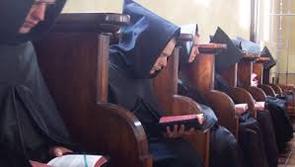
“The community of believers was of one heart and mind… devoting themselves to the teaching of the apostles and to the communal life, to the breaking of bread and to the prayers.” This glimpse of the Early Church, the great Springtime of humanity after the Resurrection, fills every Christian’s heart with longing for what once was. It particularly fills a parish priest’s heart, because we know how empty “rectory living” can be. One of the great scandals in the Church today, of which many other scandals derive, is the coldness and emptiness of your parish priest’s personal life. The average diocesan priest doesn’t live even a minimally community life: he doesn’t share his faith or even minimally fraternal towards the men with whom he lives. He either lives alone or he lives as a loner with other loners in big rectories. Most live as comfortable but loveless bachelors. I’ve lived in some pretty lonely rectories in my time, rectories that almost completely incapacitate priests from the joy that is rightfully theirs, rectories that extinguish the zeal the Church needs from her priests. It is not good for anyone that so many priests live isolated from real human community.
Sunday’s first reading concludes: “Awe came upon everyone … They ate their meals with exultation and sincerity of heart, praising God and enjoying favor with all the people.” Every priest, unless he is completely jaded, wants to enjoy this kind of fraternal charity, so essential to the very identity of priests! The Oratory is one way to renew the essential fraternal dimension of the priesthood.
People are asking me: what is the “Oratory?” What do you hope to gain by establishing it in San Francisco? The essence of the Oratory, I would say, is Fraternal Charity. It’s the kind of community we see in those early chapters of Acts. In August, Fr. Patrick Driscoll (a dear friend from the Archdiocese of St. Louis) and I will become the parish priests of St. Mary, Star of the Sea in San Francisco. We will pastor a parish, of course, and support its school, and work on other pastoral initiatives as the Archbishop directs us. But none of our work will be effective if we don’t first “devote ourselves to the teaching of the apostles and to the communal life, to the breaking of bread and to the prayers” (Acts 2). On the most human level, we first need to “eat our meals with exultation and sincerity of heart, praising God ….” The Oratory will provide secular priests with a community in which to live fraternal charity, in order that they might render authentic priestly service. Charity begins at home, but most priests don’t have a home.
Every day here at TAC three of us priests, with some students and teachers, pray the morning office together. I can’t describe the joy and energy with which these prayers fill me. Never do I love my brothers more than when I am praying with them from the heart. This is what we hope for in the Oratory: a common life of prayer, familiar discourse on the Word of God, and the continual exercise of fraternal charity. Oratorians do not take vows, as do religious order priests. St. Philip wanted his sons to live together with no other bond than the gentle but mighty bond of charity. He hoped that their lives and preaching would imitate that of the first Christians.
It will be a tricky business, bound by nothing beyond the gentle bonds of fraternal charity. We will have to depend entirely on God’s grace and forget ourselves. We ask your prayers.


 RSS Feed
RSS Feed